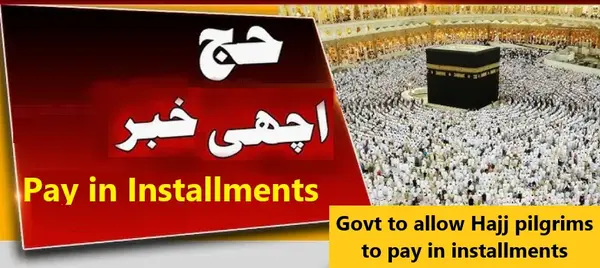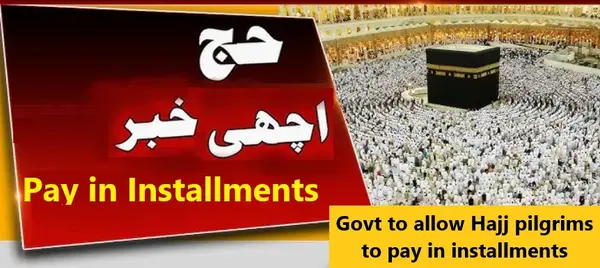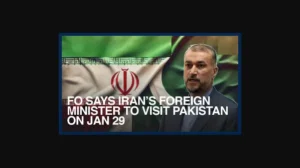Govt to allow Hajj pilgrims to pay in installments
A new relief package has been proposed by the government for the Hajj goers that include the citizens of lower and middle-class families.
Federal Cabinet Proposes Installments Option Instead of the One-time Advance on Hajj Payments.
Read More: Pakistan Government Hajj Package in 2025: Update
According to sources, instalment recovery of expenses of Hajj pilgrims was part of the government’s Hajj policy. It is going to be okayed by the federal cabinet as the ministry has compiled this Hajj policy.
Hajj 2025 Pakistan
The sources have quoted that the facility will be opened for potential pilgrims so they could pay in three installments.
As reported by sources, under this new proposed payment system, prospective pilgrims would need to initially pay Rs 200,000 as a first payment so that they might be allowed to apply for Hajj.
Once their name has been picked out through lucky draw, the pilgrims will then deposit an additional amount of Rs400,000 and the balance to be paid prior to embarkation.
Ministry of Hajj: Govt to allow Hajj pilgrims to pay in installments
Ministry officials said this plan is instituted as a way to give more relief to low and medium-income groups usually unable to pay the entire amount of money. Ministry officials told that the policy change had been intended in order for Hajj to be a little more within reach.
- The federal cabinet has recently approved the Hajj Policy 2025 through circulation summary early last month. Official sources say that this government-sponsored Hajj package is going to cost between Rs1.75 million and Rs11.75 million.
- The new policy has allocated 179,000 pilgrims from Pakistan with equal shares between the government and private tour operators, with each getting 89,605 slots.
- Special quotas have also been reserved for special categories: under the hardship category, 1,000 and for the low-income workers registered with the Employees’ Old-Age Benefits Institution (EOBI), 300.
- For 2025, intending pilgrims will have the choice between a Hajj trip as short as 20 to 25 days or a long one that is approximately 38 to 42 days.
- The new rules will also exclude children under 12 years old from the pilgrimage.
What will Pakistani pilgrims pay for Hajj in 2025?
The federal cabinet on Thursday approved the Hajj Policy 2025 through a circulation summary, which outlined the key details of the pilgrimage next year.
The government-sponsored Hajj package is likely to be in the range of Rs1.75 million to Rs11.75 million, official sources said.
Under the new policy, a quota of 179,000 pilgrims has been allowed from Pakistan, and this allocation has been divided equally between the government and private tour operators. Each has been given 89,605 slots.
The policy allows certain quotas for specific institutions or persons. For hardship people, there are 1,000 places with additional 300 for EOBI workers with low-income source registration.
Next year onwards, intending pilgrims are also free to avail any one of the two choices in terms of period or length, either going there for 38 to 42 days or visiting just for 20-25 days.
Notably, children below 12 years of age have been barred from the pilgrimage.
Under “Road to Makkah,” streamlined procedure for immigration would be available at three major airports namely Islamabad, Lahore, and Karachi.
Women traveling without Mahram (male guardian) for Hajj will be allowed subject to conditions proposed by the Islamic Ideological Council.
Hajj 2025: Pakistan outlines new health policy – Govt to allow Hajj pilgrims to pay in installments
This ministry issued a new health policy to the Hajj pilgrims with updated conditions that are set by the Saudi government.
The document clearly defines that people suffering from extreme health conditions, like cancer, heart, kidney, and respiratory diseases, would not be allowed to perform Hajj this year.
Under the policy, pilgrims are required to produce medical certificates for proving that they are fit enough for a pilgrimage.
A pilgrim who is receiving dialysis or someone experiencing a heart attack, breathing problems, or diseases in the lung will be barred from pilgrimages.
Liver failure victims, those seriously afflicted by neurological and psychiatric problems also cannot perform the Hajj.
There is a list of conditions prohibited from making this journey: physical disabilities, loss of memory, amnesia.
Pregnant women more than seven months and individuals afflicted with communicable diseases cannot make the trip.
The pilgrims barred are tuberculosis and cancer patients as well as those afflicted recently by influenza, dengue, or COVID-19.
Meningitis, influenza, COVID-19, and polio vaccination also now form part of the regulations.
The new health measures of the ministry are meant to ensure the safety of all pilgrims in the face of changing health requirements.
Govt to allow Hajj pilgrims to pay in installments
Note: The information above might not be accepted 100%. Please verify from your own sources. We will not be responsible for any kind of loss due to our content.
For more news, please visit Munafa Marketing.





